TimTaiLieu.vn - Tài liệu, ebook, giáo trình, đồ án, luận văn
Tổng hợp tất cả tài liệu, ebook, giáo trình Kế Toán - Kiểm Toán chọn lọc và hay nhất.

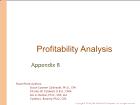 Bài giảng Appendix B: Profitability Analysis
Bài giảng Appendix B: Profitability AnalysisAppendix B: Profitability Analysis Perhaps more than any other information, managers would like to know the profitability of their products, customers, and other business segments. Accordingly, this appendix provides a coherent framework for measuring profitability. It distinguishes between absolute profitability and relative profitability.
 24 trang | Chia sẻ: nguyenlinh90 | Ngày: 19/07/2019 | Lượt xem: 1036 | Lượt tải: 1
24 trang | Chia sẻ: nguyenlinh90 | Ngày: 19/07/2019 | Lượt xem: 1036 | Lượt tải: 1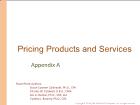 Bài giảng Appendix A: Pricing Products and Services
Bài giảng Appendix A: Pricing Products and ServicesAppendix A: Pricing Products and Services This appendix focuses on pricing products and services. It explains the economist’s approach to pricing, the absorption costing approach to cost-plus pricing, and the meaning of target costing.
 37 trang | Chia sẻ: nguyenlinh90 | Ngày: 19/07/2019 | Lượt xem: 1033 | Lượt tải: 1
37 trang | Chia sẻ: nguyenlinh90 | Ngày: 19/07/2019 | Lượt xem: 1033 | Lượt tải: 1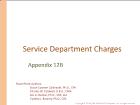 Bài giảng Appendix 12B: Service Department Charges
Bài giảng Appendix 12B: Service Department ChargesMost large organizations have both operating departments and service departments. The central purposes of the organization are carried out in the operating departments. In contrast, service departments do not directly engage in operating activities. This appendix discusses why and how service department costs are allocated to operating departments.
 12 trang | Chia sẻ: nguyenlinh90 | Ngày: 19/07/2019 | Lượt xem: 948 | Lượt tải: 1
12 trang | Chia sẻ: nguyenlinh90 | Ngày: 19/07/2019 | Lượt xem: 948 | Lượt tải: 1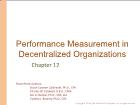 Bài giảng Chapter 12: Performance Measurement in Decentralized Organizations
Bài giảng Chapter 12: Performance Measurement in Decentralized OrganizationsChapter 12: Performance Measurement in Decentralized Organizations Managers in large organizations have to delegate some decisions to those who are at lower levels in the organization. This chapter explains how responsibility accounting systems, return on investment (ROI), residual income, operating performance measures, and the balanced scorecard...
 28 trang | Chia sẻ: nguyenlinh90 | Ngày: 19/07/2019 | Lượt xem: 1002 | Lượt tải: 1
28 trang | Chia sẻ: nguyenlinh90 | Ngày: 19/07/2019 | Lượt xem: 1002 | Lượt tải: 1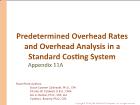 Bài giảng Appendix 11A: Predetermined Overhead Rates and Overhead Analysis in a Standard Costing System
Bài giảng Appendix 11A: Predetermined Overhead Rates and Overhead Analysis in a Standard Costing SystemThe volume variance can also be computed by multiplying the fixed portion of the predetermined overhead rate times the difference between denominator hours and standard hours. The equation on the prior slide and this equation result in identical answers. Both variance computations will be demonstrated in the forthcoming example.
 13 trang | Chia sẻ: nguyenlinh90 | Ngày: 19/07/2019 | Lượt xem: 1132 | Lượt tải: 1
13 trang | Chia sẻ: nguyenlinh90 | Ngày: 19/07/2019 | Lượt xem: 1132 | Lượt tải: 1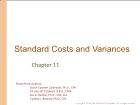 Bài giảng Chapter 11: Standard Costs and Operating Performance Measures
Bài giảng Chapter 11: Standard Costs and Operating Performance MeasuresChapter 11: Standard Costs and Operating Performance Measures This chapter extends our study of management control by explaining how standard costs are used by managers to control costs. It demonstrates how to compute direct materials, direct labor, and variable overhead variances. The chapter also defines some nonfinancial performance measures th...
 41 trang | Chia sẻ: nguyenlinh90 | Ngày: 19/07/2019 | Lượt xem: 1105 | Lượt tải: 1
41 trang | Chia sẻ: nguyenlinh90 | Ngày: 19/07/2019 | Lượt xem: 1105 | Lượt tải: 1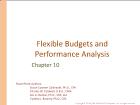 Bài giảng Chapter 10: Flexible Budgets and Performance Analysis
Bài giảng Chapter 10: Flexible Budgets and Performance AnalysisA planning budget is prepared before the period begins and is valid for only the planned level of activity. If the actual level of activity differs from what was planned, it would be misleading to evaluate performance by comparing actual costs to the static, unchanged planning budget.
 38 trang | Chia sẻ: nguyenlinh90 | Ngày: 19/07/2019 | Lượt xem: 901 | Lượt tải: 1
38 trang | Chia sẻ: nguyenlinh90 | Ngày: 19/07/2019 | Lượt xem: 901 | Lượt tải: 1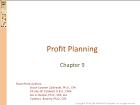 Bài giảng Chapter 9: Profit Planning
Bài giảng Chapter 9: Profit PlanningChapter 9: Profit Planning This chapter focuses on the steps taken by businesses to achieve their planned levels of profits - a process called profit planning. Profit planning is accomplished by preparing numerous budgets, which, when brought together, form an integrated business plan known as a master budget.
 13 trang | Chia sẻ: nguyenlinh90 | Ngày: 19/07/2019 | Lượt xem: 1111 | Lượt tải: 1
13 trang | Chia sẻ: nguyenlinh90 | Ngày: 19/07/2019 | Lượt xem: 1111 | Lượt tải: 1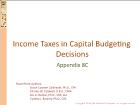 Bài giảng Appendix 8C: Income Taxes in Capital Budgeting Decisions
Bài giảng Appendix 8C: Income Taxes in Capital Budgeting DecisionsAn expenditure net of its tax effect is known as after-tax cost. Here is the equation for determining the after-tax cost of any tax-deductible cash expense:
 18 trang | Chia sẻ: nguyenlinh90 | Ngày: 19/07/2019 | Lượt xem: 962 | Lượt tải: 1
18 trang | Chia sẻ: nguyenlinh90 | Ngày: 19/07/2019 | Lượt xem: 962 | Lượt tải: 1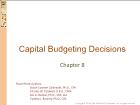 Bài giảng Chapter 8: Capital Budgeting Decisions
Bài giảng Chapter 8: Capital Budgeting DecisionsChapter 8: Capital Budgeting Decisions The term capital budgeting is used to describe how managers plan significant cash outlays on projects that have long-term implications, such as the purchase of new equipment and the introduction of new products. This chapter describes several tools that can be used by managers to help make these types of inv...
 19 trang | Chia sẻ: nguyenlinh90 | Ngày: 19/07/2019 | Lượt xem: 970 | Lượt tải: 1
19 trang | Chia sẻ: nguyenlinh90 | Ngày: 19/07/2019 | Lượt xem: 970 | Lượt tải: 1
Website đang trong thời gian thử nghiệm, chờ xin giấy phép của Bộ TT & TT.

